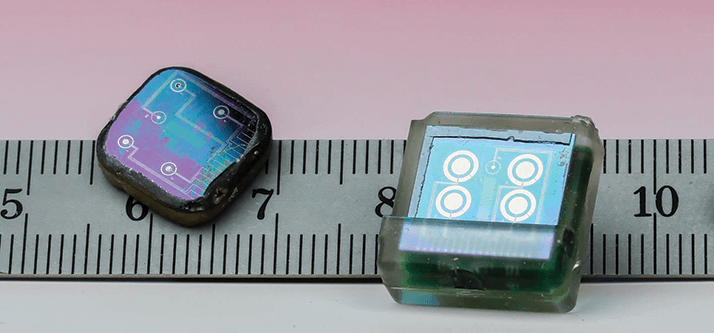Researchers at École Polytechnique Fédérale de Lausanne (EPFL) have developed a 1cm2 biosensor chip that, when placed under the skin, can simultaneously and continuously measure multiple metabolites, as well as parameters, such as pH and temperature, over a long period of time. In the short term, the team hopes the device will aid during translational medicine studies, but eventually they envision it being used to gather personal diagnostic data to monitor drug therapy.

According to Sandro Carrara, a scientist at EPFL, the sensor platform uses electrochemical biosensors based on active enzymes. “For the endogenous metabolites (typically correlated to the disease), we exploit the use of oxidases. For several disease biomarkers (for example, glucose for diabetes, cholesterol for cardiovascular diseases, or lactate for inflammations or sepsis), we can find the right oxidase that gives us the right specificity once immobilized on top of our electrochemical electrodes. In the case of exogenous metabolites (typically therapeutic compounds), we usually have two options: the drug itself may be electrochemically active or not,” says Carrara. “In the first case, the compound is directly detected without an enzyme – selectivity is driven by a series of polymeric membranes that mask interferences from other electro-active molecules. For compounds that are not electrochemically active, we may use enzymes from the cytochromes P450 family. They are central proteins in our metabolism and catalyze almost all the pharma-compounds we injected.” Carrara claims that the chip’s accuracy is comparable to that of glucometers available on the market for the daily monitoring of diabetic patients, although so far the device has only been tested in small animals. Lactate, cholesterol, bilirubin, glutamate, and dopamine, as well as several therapeutic compounds – metoxantrone, etodolac, etoposide, cyclophosphamide, ftorafur, ifosphamide, naproxen, filbuprofen, and paracetamol – have all been tested, but currently, a choice of four metabolites can be monitored simultaneously. The research team is hoping to expand function without enlarging the device, in addition to seeking an efficient and low-cost way to mass produce the chip. “Another improvement I’d like to see, which needs to be addressed through biotechnology, is more robust engineered mutants for the enzymes we can use to detect non-electrochemically-active therapeutic compounds,” adds Carrara. The end goal is bold and simple: helping to prevent people from entering dangerous ranges for certain metabolites and increasing access to personalized medicine.




